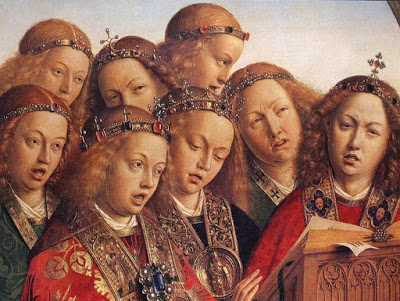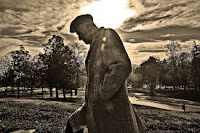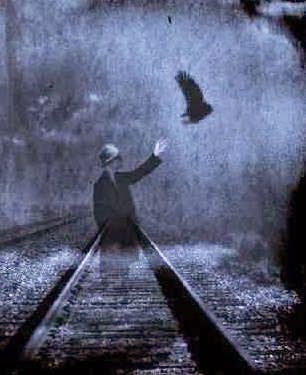Like each of us, I have
suffered, throughout my years, scars, some physical and some emotional. I have accumulated scars resulting from
incidents of injury, cancer, unwarranted personal attacks, emotional abuse, dishonesty,
greed, and lack of common human decency.
Frankly, I’d rather not dwell upon them.
Dredging up those memories is very uncomfortable for me.
There is something else
about me that people should come to understand. There is something about me that has made
me, throughout my life, particularly sensitive to the misfortune of
others. I understand their hurt; I
empathize with their plight; I can imagine walking in their shoes. I am prone to feeling regret and sorrow; and
I tend not to forget. I wish more people
were like that. In addition, the
traumatic incident need not be a recent one.
I know something about history; and, unfortunately, history is replete
with sorrow. Yes, those incidents
happened a long time ago; and, no, they did not happen to me. However, I still wish that those so many sad
incidents never had happened, especially when they have happened to the young,
those who had too short a time to experience the world, to grow, to live.
Let me relate one such
incident that, when I heard it told to me and my family, surprised and saddened
me. It is a remarkable experience of
mine when I was ten years old. For those
of you who were in this group two years ago, you may recall that I briefly
mentioned this episode in my story about my time in Europe. This time, I would like to go into greater
detail to clarify the impact this incident had upon me. The two persons suffering deep scars were two
former soldiers, one Canadian, one German.
The very end of this story is the main point, a coincidence that is most
amazing. I never have forgotten that
moment.
In 1954 through ’55, my dad
was an exchange-teacher doing research in Germany. Our family went with him, living and
traveling throughout Europe during that time.
I recall one sunny afternoon when we sat at an outdoor café while my dad
talked with several young men who now were exchange-students. One man in particular (I’ll call him “Tom,”
for I do not remember his name) stated that he originally was from Canada and
had fought, along with the Canadian and British troops, on the beaches of
Normandy and onward, trying to capture Caen.
He began to relate at length his experiences, unforeseen experiences
that had left a deep, emotional scar; for he just could not forget what
happened. He had been prepared to fight
German soldiers, but he was not psychologically prepared to fight children.
I never forgot Tom’s
poignant tale. I became perplexed about
Germany’s immoral use and waste of young people, throwing them into battle
during Germany’s inevitable collapse and defeat. Recently, I wished to understand more about
Tom’s having to battle boy-soldiers.
Under Nazi rule, joining the
Hitlerjugend became compulsory. From an
early age, obedience and fanaticism were drilled into them. The children’s mothers were inundated with
propaganda to assure that this indoctrination continued at home. Boys as young as nine received paramilitary
training. This was the only world-view
these youngsters had. Consequently, most
did not perceive the insanity of sending children to war.
Not all parents or children
wished to have anything to do with the Hitler Youth. Punishment for noncooperation was swift and
harsh. The Gestapo could arrest parents
and send them to concentration camps.
There even were reports of some SS officers using compulsion to force
boys to sign up as so-called volunteers.
Boys would be held in locked rooms without contact with their parents,
and denied food, water and toilet facilities until they signed. Others, some members of the regular army complained,
had been physically beaten into submission.
Some parents and boys, of
course, were “true-believers,” and boys eagerly joined. Those whom the authorities judged to possess
special qualities were invited to enter into the élite NAPOLA schools (Nationalpolitische
Lehranstalt, National Political
Institution of Teaching).
Those boys likely felt proud of their handsome uniforms and their own
Solingen-steel daggers. Along with a
steady dose of political propaganda, they received regular military training,
all under the guise of “playing games.”
They had no idea of what lay before them.
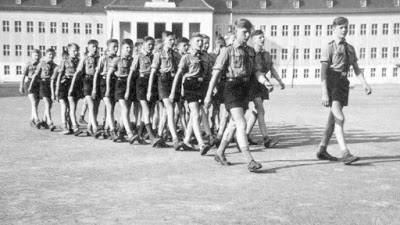
Since Germany’s defeat at
Stalingrad in 1943, Germany faced defeat after defeat with tens of thousands of
soldiers killed or captured. In
desperation, the authorities began to rely upon underage boys to fill the
gap. One such division, sent to the
front just before the Normandy invasion, was the 12th SS Hitlerjugend Division,
made up boys mostly fifteen to eightteen, although many were younger. For example, when captured, Willy Eischenberg
was just fourteen and Hubert Heinrichs only ten years old.
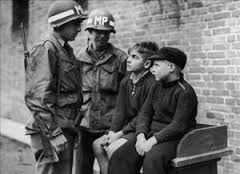 |
| Willy Etschenberg 14, Hubert Heinrichs 10 Oct 1944 |
In place of the traditional
tobacco ration, these boy-soldiers received candy, and in place of the beer
ration, they received milk, if and when it was available. Otherwise, they
trained hard to fight like adult SS men.
I consider war and violence in all forms to be evil, let alone warping
young minds toward fighting wars.
The Allies, with their
overwhelmingly superior air power, attacked repeatedly to take the area around
Caen and eventually the city itself.
26,000 tons of bombs were dropped on the old city, crushing it to
rubble. The remnants of two German
armies were trapped around Falaise and attempted to break out, but they needed
a rear guard. Sixty of the 12th
Hitlerjugend Division were given that suicidal task and took positions in the
École Superieure. Firepower from
attacking soldiers and artillery constantly bombarded the young defenders. The boys, however, refused to retreat. Of the sixty, only two, chosen as messengers,
survived.
Once the Allied soldiers
discovered that they were fighting just kids, they were surprised and
shocked. Yet, the ferocity of the boys
astounded the allied forces. One British
tank commander recalled how Hitler Youth soldiers had sprung at Allied tanks
“- – – like young wolves, until we were forced to kill them against our
will.” Their fearlessness and
determination reportedly was explained by their training in the NAPOLA schools,
along with their bitterness regarding the massive Allied bombing of civilians
in their homes and cities.
From June 7th through July 9th,
the combined 12th Hitlerjugend Division lost more than 4,000 dead
and 8,000 wounded or missing. Even the
replacement division commander, Kurt Meyer, wrote down his feelings of dismay
and sorrow. “That, which l now
experienced, was not war any more, but naked murder. I knew every one of these boys. – – These
boys had not yet learned how to live; but, God knows, they knew how to
die! The crushing chains of the tanks
ended their young lives. Tears rolled
over my face.” A few days later,
Field Marshal von Rundstedt lamented, “It is a shame that these faithful youth
were being sacrificed in a hopeless cause.” Erwin Rommel made similar remarks
shortly before he was forced to commit suicide.
Later, an Allied soldier
found an undelivered letter on the body of a youth, killed in the battle. The boy had expressed the feelings of many of
the division’s boys: “I write during one of the momentous hours before we attack,
full of excitement and expectation of what the next days will bring. – – – Some
believe in living, but life is not everything!
It is enough to know that we attack and will throw the enemy from our
homeland. It is a holy task. Above me is the terrific noise of rockets and
artillery, the voice of war.”
That
is what I learned about the young soldiers whom Tom faced around Caen and
Falaise. When he discovered whom he was
fighting, when he saw the slaughter, he was shocked. Yet, the memory which most disturbed Tom, the
memory that left such a long-term emotional scar, was the scene of backing some
of the tattered remains of the Hitlerjugend into the river. He and his fellow soldiers stood on the bank,
picking off every fighter they could see.
The whole point of this
story, the one that I could not forget, is what happened next as Tom finished
his sad tale. He ended by saying, “We didn’t stop firing until we saw no more
figures in the water. I don’t think any
of them survived.” At that point, a young
man, sitting alone at a nearby table, quietly turned to our group and stated
simply, “I did.”
All of us at our table sat in stunned
silence. After we recovered from our
initial shock, my father spoke to the person and discovered that, as a young teen,
he had been a member of the 12th Hitlerjugend Division and had
barely reached the other side of the river as all his friends perished in a
hail of bullets. Tom’s scar, or that
other young man’s scar, were not my scar; yet I was deeply moved by what I had
just heard. Not a scar, but the sad
memory of that day, shall remain with me forever. © 27 May 2015
Scars:
Postscript, Battle of the Bulge
(as told by Joseph
Robertson at age 86)
Those
remaining boys who survived the fighting around Caen regrouped to fight in the
Battle of the Bulge. American
infantryman Joseph Robertson fought against them. One incident in particular left him with a
deep, life-long scar. He was interviewed
at age 86, when he told his story in his own words.
“I was hid behind the big
tree that was knocked down or fallen, and I could see these Germans in the
woods across this big field. And, I saw
this young kid crawling up a ditch straight towards my tree. So I let him crawl. I didn’t fire at him. But, when he got up within three or four foot
of me, I screamed at him to surrender.
And instead of surrendering, he started to pull his gun towards me,
which was instant death for him. But,
this young man, he was blond, blue eyes, fair skin, so handsome. He was like a little angel. But, I still had to shoot him. And, it didn’t bother me the first night
because I went to sleep, and I was so tired.
But, the second night, I woke up crying because that kid was there. And to this day, I wake up many nights crying
over this kid. I still see him in my
dreams and I don’t know how to get him off my mind.”
Those dreams, that scar,
haunted Joseph Robertson for sixty-five years until his death at age ninety in
2009.
© 27 May 2015
About the Author
I have had a life-long fascination with people
and their life stories. I also realize
that, although my own life has not brought me particular fame or fortune, I too
have had some noteworthy experiences and, at times, unusual ones. Since I joined this Story Time group, I have
derived pleasure and satisfaction participating in the group. I do put some thought and effort into my
stories, and I hope that you find them interesting.






